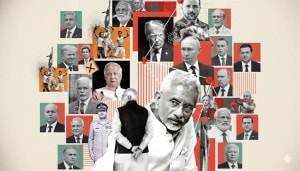Paper millionaires
In Punjab, bloody internecine feuds are still waged over property, much like during the Mughal times when sons killed fathers with impunit...

In Punjab, bloody internecine feuds are still waged over property, much like during the Mughal times when sons killed fathers with impunity, motivated by unadulterated greed. Many husbands also evolved a crooked practice after the Land Ceiling Act restricted the size of holdings they divorced their wives on paper, with the noble purpose of retaining more property. They could claim that they were now two separate legal entities. Thereafter, husband and wife continued to reside under the same roof, enjoying normal marital relations.
Today, many wives are paying the price for their acquiescence, for should the husband tire of them later, they can be thrown out without a penny. That is what happened recently to the daughter-in-law of a prominent politician. Like an illiterate rustic, she had earlier been persuaded to sign blank papers. She is cultured and well-educated, but hopelessly dependent like others of her breed. For years she traded her self-respect for the security of a luxurious home. Deprived of it now, she is finally fighting for her rights.
I met another feisty 65-year-old woman engaged in the same task, but one who commands far more respect. Ironically, although all her property is in her name, she cannot take possession of it. The widow of a top criminal lawyer from a north Punjab town, Davinder Kaur actually owns land worth a couple of crores in addition to a palatial 11-room mansion surrounded by verdant fruit orchards. Yet the machinations of her only son and scheming daughter-in-law have forced her into hiding. She has spent the past seven years as a fugitive.
An archetypal product of Punjab8217;s feudalistic village society, Kaur8217;s son is a drunken layabout, seldom ever in his senses. After he allegedly killed his own father, his wife and 17-year-old daughter now regularly thrash his mother. Their aim is evident: they wish to torture her into transferring all her property to them. They have already taken control of her husband8217;s transport company. And in this pursuit, they are devoid of compassion or respect either for her age or her physical debility. She underwent breast surgery some years ago, which has left her with a weak left arm. The last time she was thrashed face down, her daughter-in-law flung her out of the house without shoes or even a dupatta. She spent six days in hospital with a fractured nose. From there she escaped. Now she shuttles between her daughter8217;s house and those of sundry other relatives.
Yet, despite all the torture, both physical and mental, that she has been subjected to, I was amazed to see that the old lady8217;s spirit had not broken. She is determined to get the better of her son. Eyes blazing in her lined face, she cried, 8220;Mere andar aag jaldi hai there is a fire burning inside me.8221; To seek justice, she has approached the court.
Kaur8217;s objective is to sell off her land and purchase a decent house to live in. A house where she can live without fear, head held high with dignity. Her pampered lifestyle while her husband was alive now seems to be a surrealistic dream. But she is going to fight to restore at least a part of it. She has efficiently drawn up a new will, leaving all her property to the one devoted daughter who has bothered to look after her.
Kaur8217;s decision has over-turned the standard Punjabi practice of showering the male with privileges, while ignoring the female. Yet the pitiable plight she finds herself in is hardly unusual. What distinguishes her from the rest of her ilk is sheer spunk. The unshakable resolve to fight to the finish. It is her property that is at stake. And she does not mind dying to retain it. After all, this is Sada Punjab.
- 01
- 02
- 03
- 04
- 05































